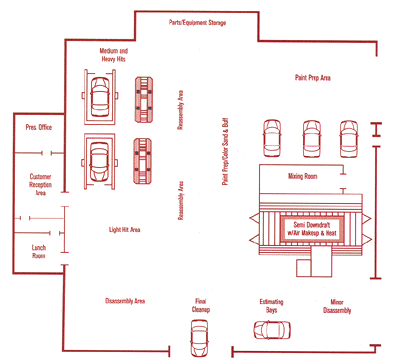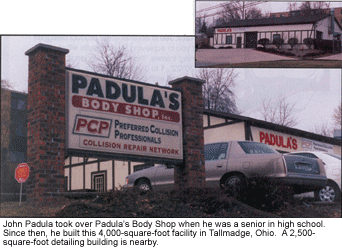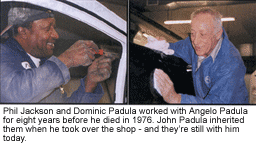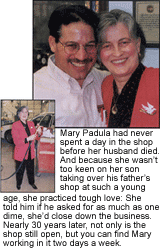A shop owner since the age of 17, John Padula runs his shop on his terms
Shop Name:Padula’s Body Shop , Inc.
Location: Tallmadge, Ohio
Established: 1947
Square Footage: Main shop 4,000 square feet; detailing building 2,500 square feet
President: John Padula
No. of Employees: 8 – 1 body tech, 1 body tech helper, 2 painters, 1 frame tech, 1 detailer, 2 secretaries, 1 assistant manager
Average Repair Volume: 20 cars per month
Average Repair Cost: $1,839
He had to stop her.
At the age of 17, John Padula had just lost his father, and his newly widowed mother was about to sell his father’s shop.
“I was a senior in high school when my Dad died,” says John Padula, owner of Padula’s Body Shop, in Tallmadge, Ohio. “My Dad started the business in 1947 and owned the shop for 29 years. He was only 59 when he died in 1976, and I’d been working there for seven years. I’d always dreamed of running it one day, but my mom was just going to sell the business.”
Lucky for everyone, she didn’t. And since that time, Padula has gone on to have a remarkable career in the collision repair industry. He earned both high school and college degrees while running the shop. He also became actively involved with the Automotive Service Association (ASA), first serving on his local chapter’s board of directors, moving up to president at the age of 23 and later becoming collision division chairman of ASA Ohio.
All that action wasn’t enough for Padula so, in 1997, he created Preferred Collision Professionals (PCP), a franchise designed to keep body shops independent. Four shops signed on in the first two months.

But who could’ve possibly known, back in 1976, that a 17-year-old could not only successfully assume the role of owner, but run the business with the kind of conviction that would’ve made his father proud?
A Teen with a Dream
Mary Padula was concerned for her son’s future. She felt that finishing high school and continuing to college was the best career path for her oldest child. Besides, she knew nothing about Padula’s Body Shop. While today she works as the shop’s receptionist two days a week, when her husband died, she’d never even spent a day at the business.
“She was in disarray,” says Padula. “She had three teenage kids, and I was the oldest. She knew nothing about the business – absolutely nothing. She did know that she wanted what was best for me. She just felt like, ‘You’ve got your whole life ahead of you.’ “
It was at this point that Padula senior’s attorney, Dominic Olivo, entered the scene. He’d known Padula junior his entire life, and he’d always known the young Padula was destined to take over his father’s business. He also knew that Mrs. Padula had ideas for her son’s career that didn’t include the body shop.
“He told my mom, ‘Give him a chance. What the heck do you have to lose? You’ve got a bunch of old equipment, and the kid’s dedicated as hell. If he can’t make it in a year, then he still has the rest of his life ahead of him – and so do you.’ “
Mary Padula decided to give her son a chance – with one condition: He could use the equipment for free, but he’d have to pay his own building rent and if he ever asked for as much as a dime, she’d close the shop.
To some that would’ve been tough conditions to meet. For Padula, however, it was a challenge – and just the motivation he needed. It helped him to develop what’s become his strongest personality trait and defines who he is as a person: He not only welcomes the challenges of taking the path of most resistance, but he thrives on it. A stark contrast to many of his industry peers – who, in many cases, have chosen the path of least resistance out of indifference.
Make no mistake, Padula could never be described as indifferent. Even as a teenager, he was strong-willed, passionate and well-prepared for the challenge of being a shop owner.
Padula had been going to the shop with his dad on Saturdays since the age of 10. Besides working around the shop sweeping floors and helping out, he spent time in the front office learning about invoices, statements and workflow management.
By the time he was 15, he was working in the shop during the summer and during days off from school. He not only became proficient with the technical and managerial procedures of collision repair, he also learned a valuable industry lesson – the philosophy of being profitable.

“You make your money in the front office,” says Padula. “You make money by managing the place properly. If you have qualified technicians out in the shop, they should be able to do their job properly with the guidance you give them.”
Padula had two qualified technicians working for him in the beginning. Each had been with his father eight years at the time of his father’s death. In fact, those two employees – Phil Jackson and Dominic Padula – are still with Padula today. Dominic is Padula’s uncle and was head painter for 27 years before becoming the shop’s troubleshooter, quality control person and painter’s helper. Jackson is the frame tech and does heavy hits and body work. He also trains participants in the shop’s apprenticeship program.
Few shops can retain techs for a year, let alone 30. What’s Padula’s secret? Good leadership. Padula says that the best leaders lead by example.
“If the boss is in the front office cutting crazy deals all the time and then telling his techs to cut corners to do the work, that projects an image to them,” he says. “Well, we just don’t do it. I have to give my employees a lot of credit. The newest guy’s been here 10 years. I’m loyal to them, and they’re loyal to me. I’m dedicated to making sure that they make a living, and they’re dedicated to making sure that we turn out an excellent product.”
Padula’s business philosophies include not only doing top-notch work, but providing outstanding customer service. That helps to keep customers loyal, too. Padula’s customer base is large and, in many cases, spans three generations.
“We have customers walking in the door saying, ‘My mom and dad said to come here because you guys fixed cars for them and for my grandparents.’ ”
Johnny Lightening
Padula’s always been accustomed to performing multiple tasks quickly. Today, he divides his time between his shop and his franchise, and he’s always coming up with ideas for the future. With so much keeping him busy, it’s no wonder he was able to handle the hectic schedule he had when he took over the business his senior year.
“I’d go to the shop about 7 a.m., get some paperwork squared away, tell the two employees, ‘This is what you’ve got to do today,’ and I went to school at 8 a.m.” Padula says. “I’d be back at 12:30 and be there the rest of the day until 7 or 8 at night. It was a grueling schedule. That’s probably why I keep grueling myself now. That’s all I’ve been used to my whole life.”

Besides having an innate desire to choose the path of most resistance because he enjoys a challenge, he’s also got another trait that’s proven beneficial: He’s always been ahead of his time.
For example, Padula’s was the first body shop in Akron to utilize computerized estimating. Also, because he didn’t like the way the collision repair industry was changing and how the changes were affecting shop owners like himself, Padula took steps to develop PCP to ensure his own independence – and to offer a lifeline to his peers.
From Teen to Shop Owner to Franchise Operator
Part of what PCP provides is good business advice – advice that’s based on Padula’s industry experience. He conducts seminars and one-on-one sessions on every topic from DRP contracts to what type of estimating program to run.
“The legal seminars are just one of the many seminars that PCP offers its franchisees,” he says. “They’re there to give the franchisee the knowledge he needs to be able to function in an ever-changing marketplace. You’ve got to be aware of agreements that you’re signing, what they say, what they bind you to. Personally, I’m not involved with any DRPs.”
PCP also provides advertising for its franchisees. Padula says that because PCP has an advertising co-op, everyone gets a “hell of a bang for their advertising buck,” with ads for radio, billboards, the Yellow Pages, individual local advertising and brochures. Padula spends 3 percent of his gross on advertising; he says the national average is 5 or 6, but he gets five times the exposure for his money through PCP.

But PCP doesn’t stop there. Padula is currently expanding PCP with the help of a rep. He wants shop owners to realize what PCP is all about and that it’s there for their benefit. He keeps a proactive stance in the collision repair industry because he wants shop owners like himself to prosper with minimal struggle.
“The philosophies of being in business, especially in a free marketplace – which we don’t function in – should be to be able to work smarter and not harder.”
Padula should know. He’s spent his lifetime in the industry. And having had the opportunity to prove himself at such a young age gave him the confidence to live his life – and run his shop – on his terms. And that’s exactly what he does.
“My Dad fought in W.W.II,” says Padula. “It was all about freedom. If you don’t stand your ground and you don’t have integrity and you don’t have morals and you don’t have values, then you’re really enslaved by the whole system that you’re part of. What good is that?”
Writer Bob Bissler is senior editor of BodyShop Business.
| Shop Equipment: Who, What & How Many Lift: Unich French Lift (a portable lift). Measuring and pulling systems: Blackhawk bench with a universal and dedicated measuring system; one 3-bay Corack system; pots. Air filtration system: Yes. Vacuum System: Yes (a portable one). Dedicated prep station: Not yet. (Padula’s currently thinking about adding an addition so he can install one.) Paint mixing system: BASF.Paint: R-M brand (a BASF paint). Spraybooth: DeVilbiss semi-downdraft. |













